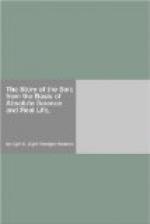This letter was written in February, 1907 and contained the following statement regarding the famine district in which the writer was located:
“At the present time the only practical thing to do is to let four hundred thousand people starve, and try to get seed grain for the remainder to plant their spring crops.”
I think we have failed utterly, Mr. Hill, to lay special emphasis upon either the evolutional or the emotional in agriculture. Is it not probable that a superabundance of emotion would even permit the constitution to wave the bread requirement in the bread-and-water-with-love diet? As a cure for pessimism the emotional tonic is strongly recommended.
On the other hand, there are some people who are even too emotional, people who are inclined to sit up and take notice when the mathematics and statistics are spread out in clear light and plainly reveal the fact that the time is near at hand when their children may lack for bread. (They already lack for meat and milk and eggs in many places). To ally any feeling of this sort that might tend to excite those who are so emotional as even to love their own grandchildren, some sort of soothing syrup should be administered. A preparation put out by the Chief of the United States Bureau of Soils and fully endorsed by the great optimist, the Secretary of Agriculture, is recommended as an article very much superior to Mrs. Winslow’s. As a moderate dose for an adult, read the following extracts from pages 66, 78, and 80 of Bureau of Soils Bulletin 55 (1909), by the Chief of the Bureau:
“The soil is the one indestructible, immutable asset that the nation possesses. It is the one resource that cannot be exhausted; that cannot be used up.”
“From the modern conception of the nature and purpose of the soil it is evident that it cannot wear out, that so far as the mineral food is concerned it will continue automatically to supply adequate quantities of the mineral plant foods for crops.”
“As we see it now, the main cause of infertile soils or the deterioration of soils is the improper sanitary conditions originally present in the soil or arising from our injudicious culture and rotation of crops. It is, of course, exceedingly difficult to work out the principles which govern the proper rotation for any particular soil.”
“As a national asset the soil is safe as a means of feeding mankind for untold ages to come. So far as our investigations show, the soil will not be exhausted of any one or all of its mineral plant food constituents. If the coal and iron give out, as it is predicted they will before long, the soil can be depended on to furnish food, light, heat, and habitation not only for the present population but for an enormously larger population than the world has at present.”
“Personally, I take a most hopeful view of the situation as respects the soil resources of our country and of the world at large. I cannot bring myself to believe that the discouraging reports that have been issued from time to time as to the threatened deterioration of our soils, as to the exhaustion of any particular element of fertility, will ever be realized.”




